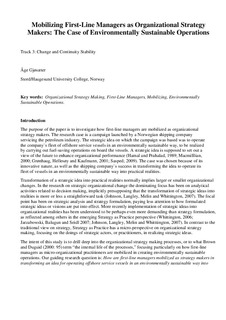| dc.description.abstract | The purpose of the paper is to investigate how first-line managers are mobilized as organizational strategy makers. The research case is a campaign launched by a Norwegian shipping company servicing the petroleum industry. The strategic idea on which the campaign was based was to operate the company`s fleet of offshore service vessels in an environmentally sustainable way, to be realized by carrying out fuel-saving operations on board the vessels. A strategic idea is supposed to set out a view of the future to enhance organizational performance (Hamal and Prahalad, 1989; Macmilllian, 2000; Grønhaug, Hellesøy and Kaufmann, 2001; Sasped; 2009). The case was chosen because of its innovative nature, as well as the shipping company`s success in transforming the idea to operate its fleet of vessels in an environmentally sustainable way into practical realities.
Transformation of a strategic idea into practical realities normally implies larger or smaller organizational changes. In the research on strategic organizational change the dominating focus has been on analytical activities related to decision making, implicitly presupposing that the transformation of strategic ideas into realities is more or less a straightforward task (Johnson, Langley, Melin and Whittington, 2007). The focal point has been on strategic analysis and strategy formulation, paying less attention to how formulated strategic ideas or visions are put into effect. More recently implementation of strategic ideas into organizational realities has been understood to be perhaps even more demanding than strategy formulation, as reflected among others in the emerging Strategy as Practice perspective (Whittington, 2006; Jarzabowski, Balugun and Seidl 2007; Johnson, Langley, Melin and Whitttington, 2007). In contrast to the traditional view on strategy, Strategy as Practice has a micro-perspective on organizational strategy making, focusing on the doings of strategic actors, or practitioners, in realizing strategic ideas.
The intent of this study is to drill deep into the organizational strategy making processes, or to what Brown and Duguid (2000: 95) term “the internal life of the processes,” focusing particularly on how first-line managers as micro-organizational practitioners are mobilized in creating environmentally sustainable operations. Our guiding research question is: How are first-line managers mobilized as strategy makers in transforming an idea for operating offshore service vessels in an environmentally sustainable way into micro-organizational realities? This is an important research question because our present knowledge about transforming a strategic idea into micro-organizational realities is limited, but is reflected in numerous publications confirming the failure of strategic change and implementation processes (e.g., Beer, Eisenstat and Spector, 1990; Kotter, 1996; Grønhaug et al., 2001; Brunsson, 2007; Johnson, Langley, Melin and Whittington 2007; Whittington, 2011; Hennestad and Revang, 2012; Meyer and Stensaker, 2012). Further knowledge about the implementation of strategic ideas into practical realities is therefore of significant importance for any organization struggling to improve its competitive position, not the least of which are companies operating within the shipping industry subject to strong international competition while at the same time under pressure to operate in environmentally sustainable ways (Norwegian Government Report, 2011-2012; Behring, 2012).
The remaining part of the paper is organized as follows. First I describe the theoretical perspectives regarding organizational strategy making, including first-line managers as micro-organizational actors in the strategy making processes. Thereafter I present the case constituting the empirical basis for the research. Then I describe the methodological approach for exploring the research question, followed by a summary of findings regarding key practices in mobilizing first-line managers as organizational strategy makers. Finally, I discuss and deepen some aspects of the findings, and point to contributions and avenues for further research. | no_NO |
